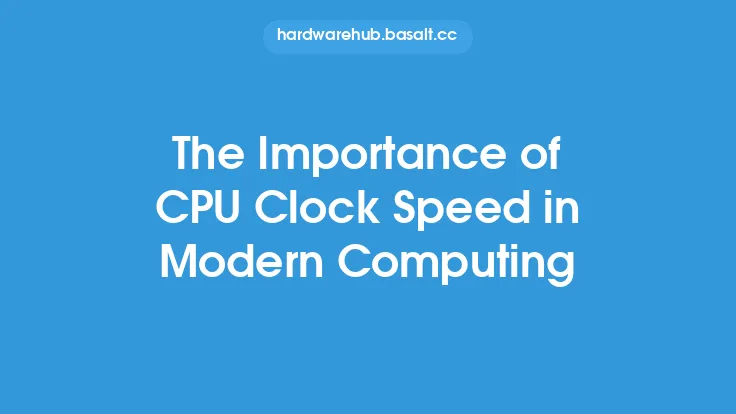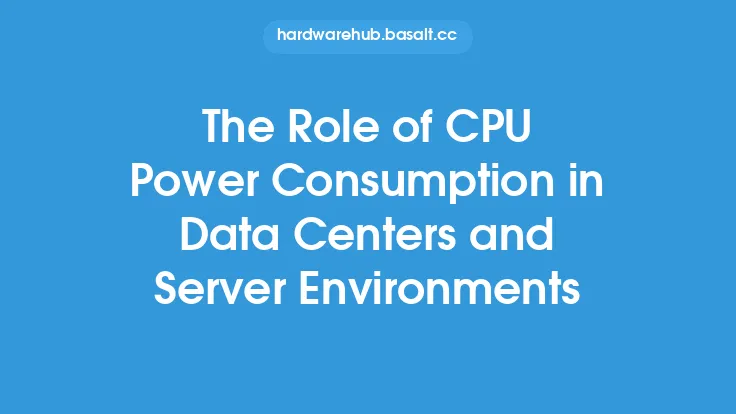In modern computing, the power consumption of a Central Processing Unit (CPU) plays a crucial role in determining the overall efficiency and performance of a system. The CPU, being the brain of the computer, is responsible for executing instructions and handling tasks, and its power consumption has a direct impact on the system's power bill, heat generation, and overall reliability. As technology advances and computers become increasingly powerful, the importance of CPU power consumption has grown exponentially.
Introduction to CPU Power Consumption
CPU power consumption refers to the amount of electrical power required by the CPU to perform its functions. This power is typically measured in watts (W) and is influenced by various factors, including the CPU's architecture, clock speed, voltage, and workload. The power consumption of a CPU can vary significantly depending on the specific application and usage scenario. For example, a CPU running a simple web browser may consume significantly less power than one running a demanding video editing software.
CPU Architecture and Power Consumption
The architecture of a CPU has a significant impact on its power consumption. Modern CPUs are designed with power efficiency in mind, and manufacturers use various techniques to reduce power consumption while maintaining performance. These techniques include dynamic voltage and frequency scaling (DVFS), clock gating, and power gating. DVFS allows the CPU to adjust its voltage and frequency in real-time to match the workload, while clock gating and power gating enable the CPU to turn off or reduce power to unused components. Additionally, the use of advanced materials and manufacturing processes, such as FinFET (fin field-effect transistor) and 3D stacking, has also contributed to reduced power consumption.
CPU Power States and Modes
CPUs have various power states and modes that help reduce power consumption during idle or low-activity periods. These power states include C-states (C0, C1, C2, etc.), which represent different levels of idle power consumption, and P-states (P0, P1, P2, etc.), which represent different levels of active power consumption. The CPU can transition between these states to balance power consumption and performance. For example, when a CPU is idle, it can enter a low-power C-state to reduce power consumption, and when it needs to perform a task, it can transition to a higher P-state to increase performance.
Thermal Design Power (TDP) and Power Consumption
Thermal Design Power (TDP) is a measure of the maximum power consumption of a CPU under normal operating conditions. TDP is typically specified by the manufacturer and is used to determine the cooling requirements of the system. However, TDP is not always a direct indicator of actual power consumption, as it can vary depending on the workload and system configuration. Additionally, some CPUs may have a higher TDP than others, but still consume less power under certain workloads due to their more efficient architecture.
CPU Power Consumption and Reliability
High CPU power consumption can lead to increased heat generation, which can negatively impact system reliability. Excessive heat can cause component failure, reduce system lifespan, and increase maintenance costs. Furthermore, high power consumption can also lead to increased electromagnetic interference (EMI), which can affect system performance and reliability. To mitigate these effects, system designers and manufacturers use various techniques, such as heat sinks, fans, and thermal interfaces, to manage heat and reduce power consumption.
CPU Power Consumption and System Design
System design plays a critical role in determining CPU power consumption. The choice of motherboard, memory, and storage can all impact power consumption, as can the system's cooling and power delivery systems. For example, a system with a high-efficiency power supply and a well-designed cooling system can help reduce CPU power consumption and improve overall system efficiency. Additionally, the use of power-saving features, such as suspend-to-RAM and wake-on-LAN, can also help reduce power consumption during idle periods.
Conclusion
In conclusion, CPU power consumption is a critical aspect of modern computing, with significant implications for system efficiency, performance, and reliability. As technology continues to advance and computers become increasingly powerful, the importance of CPU power consumption will only continue to grow. By understanding the factors that influence CPU power consumption and using techniques to reduce it, system designers and manufacturers can create more efficient, reliable, and cost-effective systems that meet the demands of modern computing.





